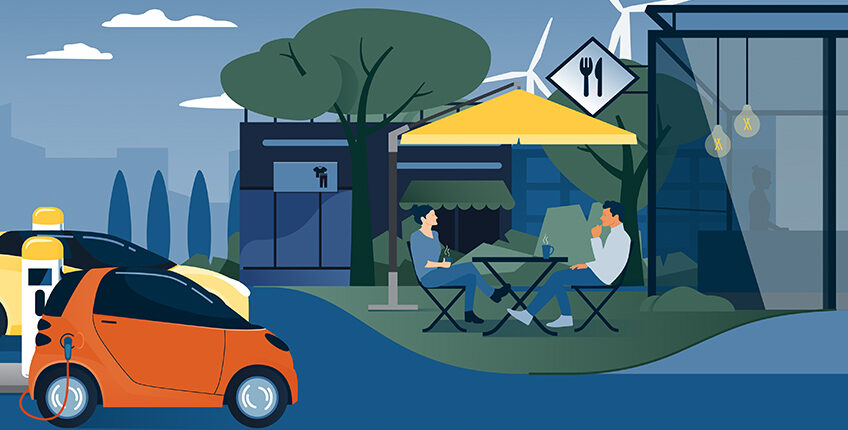The German Hotel and Restaurant Association (DEHOGA Bundesverband) surveyed 1,500 members on the subject: ‘Charging infrastructure in hospitality’*. The National Centre for Charging Infrastructure supported DEHOGA in drafting the questions. The result: Half of the business surveyed have already installed charging infrastructure or are planning to do so.
One in three participating businesses wishes to either install or expand charging infrastructure
About a quarter of the 1,500 businesses that participated in the survey already provide their patrons with the opportunity to charge e-cars (26.1 per cent). In the hotel sector, this number is almost 44 per cent, with just under 9 per cent in the restaurant trade. One third of businesses (33.1 per cent) availed of public subsidies for installation.
Another quarter of businesses plan to provide charging services in future (23.6 per cent), with around 27 per cent in the hotel business and almost 13 per cent in the restaurant trade. About 33 per cent plan to install charging points or expand their number over the next 12 months.
Of those offering charging facilities, most have one or two charging points (1 CP: 29.5 per cent; 2 CP: 43.8 per cent), with almost 10 per cent offering 3 or four charging points. One per cent offer their guests even more than 10 charging points. In the vast majority of cases (82 per cent), the charging power of the charging stations are more than 3.7 kW up to and including 22 kW.
41.1 per cent of charging infrastructure that is provided by hotels and restaurants is publicly accessible and therefore can be used by non-guests. Around a quarter of the businesses (25.6 per cent) provide free charging. Adjusted for the effects of the Corona pandemic, the use of charging facilities has recently increase according to those surveyed (57.9 per cent) or has remained the same (39.6 per cent).
Reasons for and against installing charging infrastructure
The majority of businesses offering charging facilities now regard this service as standard – 72.2 per cent agreed with this statement. The growth in environmental awareness was named as the second most cited reason (52.6 per cent), and the acquisition of new customer groups was in third place (50.3 per cent). The three reasons named most frequently for not offering charging services were the high investment costs (39.7 per cent), the still too low customer demand (39.5 per cent) and few or non-existent parking options (30.1 per cent).
Ingrid Hartges, Chief Executive of DEHOGA Bundesverband:
“The number of registered electric cars continues to rise. Day trips or holidays with e-bikes are also becoming more popular. This increases the demand for a reliable charging infrastructure, and hotels and restaurants can make a big contribution here. The results of our survey on the existing services in the hospitality industry are encouraging because they confirm that many businesses have recognized the electric mobility movement and are taking action to be good hosts in this area as well. Together with partners like the National Centre for Charging Infrastructure and policy-makers, DEHOGA wants to continue to support this development and help businesses with both advice and action.”
Johannes Pallasch, Spokeperson for the management team in the National Centre for Charging Infrastructure:
“In daily life, e-car users should be able to recharge wherever they park their vehicles over a longer period, for example in hotel and restaurant car parks. The results of the DEHOGA survey show that the hospitality industry is very open to developing charging infrastructure. The survey results are relevant for the Centre’s work because they provide an insight into the hotel and restaurant sector, which is an important player in the expansion of charging infrastructure. That is why we supported the survey already in its conception phase.”
Download the results report (DE)
About DEHOGA and the National Centre for Charging Infrastructure
DEHOGA Bundesverband represents the interests of approximately 200,000 businesses in the hospitality sector in Germany. Commissioned by the Federal Transport Ministry (BMDV) and under the umbrella of the federally-owned NOW GmbH, the National Centre for Charging Infrastructure plans, supports and monitors activities to expand charging infrastructure in Germany.
* The survey was conducted in July 2022. Because of the sampling size, representativeness of the hotel sector is greater.


